 March 2021 in “Mansoura Veterinary Medical Journal /Mansoura Veterinary Medical Journal”
March 2021 in “Mansoura Veterinary Medical Journal /Mansoura Veterinary Medical Journal” Ringworm is a common, contagious fungal infection in dogs that can spread to humans and requires lengthy treatment.
 November 2020 in “Journal of The American Academy of Dermatology”
November 2020 in “Journal of The American Academy of Dermatology” Oral JAK inhibitors help regrow hair in alopecia patients.
 165 citations,
September 2011 in “Journal of Public Policy & Marketing”
165 citations,
September 2011 in “Journal of Public Policy & Marketing” People who are more materialistic often expect life changes from buying things, leading to more debt and credit misuse.
 44 citations,
July 2011 in “Dermatologic Therapy”
44 citations,
July 2011 in “Dermatologic Therapy” Finasteride effectively increases hair growth in men with AGA, works better for those over 30, and may cause some side effects.
 37 citations,
May 2003 in “Journal of Consumer Marketing”
37 citations,
May 2003 in “Journal of Consumer Marketing” The debate on direct-to-consumer pharmaceutical ads continues, with consumers finding them educational and doctors concerned about their impact on patient relationships and medication understanding.
 19 citations,
August 2007 in “Seminars in Plastic Surgery”
19 citations,
August 2007 in “Seminars in Plastic Surgery” Newer skin resurfacing lasers reduce damage and scarring, with some approved for safe use and minimal side effects.
 18 citations,
June 1998 in “Circulation”
18 citations,
June 1998 in “Circulation” Mild essential fatty acid deficiency can cause health issues and is worsened by low-fat diets.
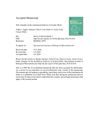 13 citations,
May 2016 in “International journal of biological macromolecules”
13 citations,
May 2016 in “International journal of biological macromolecules” Keratin's mechanical properties are influenced by hydrogen bonds and secondary structure, and can be improved with the SPD-2 peptide.
 12 citations,
May 1989 in “Postgraduate Medicine”
12 citations,
May 1989 in “Postgraduate Medicine” The document concludes that hair loss is common and can be treated with medications like minoxidil or surgical options, and it significantly affects people's psychological well-being.
 11 citations,
May 2009 in “Medical Hypotheses”
11 citations,
May 2009 in “Medical Hypotheses” Male pattern baldness is an unintended side effect of the body's use of androgens for muscle growth, especially in those genetically prone to it.
 10 citations,
June 2010 in “Fertility and Sterility”
10 citations,
June 2010 in “Fertility and Sterility” Patients with PCOS tend to score their hirsutism higher than clinicians, making self-scoring less useful for diagnosis.
 8 citations,
February 2005 in “Veterinary dermatology”
8 citations,
February 2005 in “Veterinary dermatology” Chesapeake Bay retrievers' hair loss is likely a breed-specific, hereditary condition linked to abnormal steroid levels and distinct skin changes.
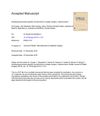 6 citations,
November 2016 in “Journal of Plastic Reconstructive and Aesthetic Surgery”
6 citations,
November 2016 in “Journal of Plastic Reconstructive and Aesthetic Surgery” Custom-made consent forms for each plastic surgery procedure improve patient understanding and reduce legal issues.
 6 citations,
August 1991 in “Pediatric Clinics of North America”
6 citations,
August 1991 in “Pediatric Clinics of North America” The document concludes that various hair and scalp disorders in children have specific treatments and proper diagnosis is essential.
 4 citations,
September 2020 in “Journal of Cosmetic Dermatology”
4 citations,
September 2020 in “Journal of Cosmetic Dermatology” PRP treatment significantly increased hair density and thickness in male hair loss.
 4 citations,
December 2012 in “Human Biology”
4 citations,
December 2012 in “Human Biology” The most different genetic segment between Africans and East Asians is the EDA2R/AR region, with two main types influenced by population changes and natural selection, and linked to baldness.
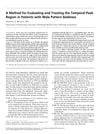 4 citations,
May 2002 in “Dermatologic Surgery”
4 citations,
May 2002 in “Dermatologic Surgery” The method improves natural appearance in hair restoration by properly evaluating and treating the temporal peak region.
 3 citations,
November 2018 in “PubMed”
3 citations,
November 2018 in “PubMed” SMT effectively treats advanced baldness with high satisfaction.
 2 citations,
September 1996 in “The American Journal of Cosmetic Surgery”
2 citations,
September 1996 in “The American Journal of Cosmetic Surgery” The authors suggest using a standard system to name hair grafts to improve communication in hair restoration.
 1 citations,
December 2021 in “International journal of research in dermatology”
1 citations,
December 2021 in “International journal of research in dermatology” Dermatologists should learn more about shampoos to better treat hair and scalp issues.

Attractive women slightly worsened mood, green backgrounds improved mood, and older people had better moods.
 April 2024 in “Research Square (Research Square)”
April 2024 in “Research Square (Research Square)” A 27-year-old with APS-1 showed improvement in symptoms after treatment.
 October 2023 in “Cognizance journal”
October 2023 in “Cognizance journal” The document suggests using natural remedies like bloodletting and honey for various health issues but lacks scientific evidence for their effectiveness.
 July 2023 in “International Ayurvedic medical journal”
July 2023 in “International Ayurvedic medical journal” Ayurvedic treatment can effectively manage PCOS and its symptoms.
 February 2023 in “International Journal of Advanced Research in Science, Communication and Technology”
February 2023 in “International Journal of Advanced Research in Science, Communication and Technology” Herbal shampoos with Neem and Tulsi might be safer and more effective for controlling dandruff.
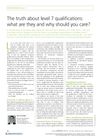 December 2017 in “Journal of Aesthetic Nursing”
December 2017 in “Journal of Aesthetic Nursing” Level 7 qualifications for aesthetic procedures like botox and fillers are not mandatory, but they can improve skills and credibility.
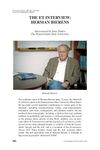 November 2012 in “Econometric Theory”
November 2012 in “Econometric Theory” Herman Bierens had a successful career in econometrics, contributed to education, and plans to continue research after retirement.
 April 2012 in “The Journal of Urology”
April 2012 in “The Journal of Urology” More prostate biopsies increase the chance of finding cancers that may not need treatment.
 March 2012 in “Pathy's Principles and Practice of Geriatric Medicine”
March 2012 in “Pathy's Principles and Practice of Geriatric Medicine” Older adults often have skin problems due to aging, and treating these conditions requires attention to both physical and mental health.
 October 2008 in “The Journal of Urology”
October 2008 in “The Journal of Urology” Finasteride reduces prostate cancer risk but may increase high-grade tumors and has side effects; biopsy methods have similar outcomes; psychosocial factors affect sexual recovery post-surgery.






























